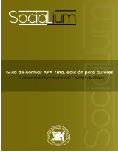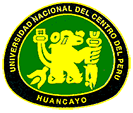Adaptation of the SISCO SV Academic Stress Inventory to the context of the COVID-19 crisis
DOI:
https://doi.org/10.26490/uncp.sl.2020.4.2.669Keywords:
academic stress, student, university, COVID-19Abstract
The research objective was adapted SISCO SV Academic Stress Inventory to the context of the crisis by COVID-19, the basic type study, descriptive level, non-experimental design, simple descriptive cross-sectional; For content validation, a sample of 20 experts in psychology, education, research and statistics will be consulted, who will be provided with a generic validity sheet and a specific validity sheet; They are also needed with a sample of 151 students from four universities in the Junín region of Peru, to whom they must administer the adapted inventory of academic stress SISCO SV de Barraza (2018), to assess the validity of construction and reliability. The results indicated by the instrument present generic and content-specific validity according to the Aiken coefficient of concordance V, with indices greater than 0.75 (excellent validity); likewise, construct validity was determined with corrected Pearson correlation coefficients greater than 0.2, between sufficient validity (0.2 to 0.34), good (0.35 to 0.44), very good (0.45 to 0.54) and excellent (0.55 to 1); the reliability of the symptoms instrument the Cronbach's alpha internal consistency coefficient of 0.9248 for the stressors dimension, 0.9518 for the symptoms dimension and 0.8837 for the coping strategies dimension (excellent reliability). It was concluded that the SISCO SV Academic Stress Inventory, adapted to the context of the crisis by COVID-19, is valid and reliable.
Downloads
References
Alfonso, B., Calcines, M., Monteagudo de la Guardia, R., y Nieves Achon, Z. (2015). Estrés Académico. EDUMECENTRO, 163-178.
Ancajima, L.D. (2017). Propiedades psicométricas del Inventario SISCO del Estrés Académico en universitarios de la ciudad de Trujillo. Tesis de Licenciatura en Psicología, Universidad César Vallejo, Trujillo.
Barraza, A. (2007). El Inventario SISCO del Estrés Académico. INED, 89 -93.
Barraza, A. (2018). Inventario SISCO SV-21 Inventario SIStémico COgnoscitivista, para el estudio del Estrés Académico. Segunda versión de 21 Ítems. México: ECORFAN.
Condoyque, K., Ramírez, A., & Hernández, P. (2016). Nivel de Estrés en estudiantes de las licenciaturas en Enfermería y nutrición de la Universidad de la Sierra Sur. Tesis de Licenciatura.
Ferrer, R., Guilera, G. y Peró, M. (2011). Propiedades psicométricas del instrumento de valoración de riesgos psicosociales del instituto nacional de seguridad e higiene en el trabajo (FPSICO). Recuperado de https://www.insst.es/documents/94886/96076/Informe+justificaci%C3%B3n.pdf/51389823-888d-4d5b-ae6c-7deee1b3d3de
García, F. (12 de mayo de 2020). El sistema universitario ante la COVID-19: corto, medio y largo plazo. Obtenido de Universidad: https://bit.ly/2YPUeXU.
González, F. (2007). Instrumentos de evaluación psicológica. Cuba: Editorial de Ciencias Médicas.
Gonzáles, N., Tejeda, A., Espinosa, C. y Ontiveros, Z. (2020). Impacto psicológico en estudiantes universitarios mexicanos por confinamiento durante la pandemia por Covid-19. Scielo México, 1-17. Recuperado de https://preprints.scielo.org/index.php/scielo/preprint/download/756/1024
Lozano, A., Fernández-Prados, J., Figueredo, V. y Martínez, A.M. (2020). Impactos del confinamiento por el COVID-19 entre universitarios: Satisfacción Vital, Resiliencia y Capital Social Online. Hipatia Press, 79-104.
Lucini, D., Pagani, M. (2012) From stress to functional syndromes: An internist’s point of view. European Journal of Internal Medicine, 23(4) 295-301. DOI: 10.1016/j.ejim.2011.11.016
Martínez, S. (2020) La Educación en tiempos de la COVID- 19. Radiónica. Recuperado de https://www.radionica.rocks/blogs/esteban-zapata-calderon/opinion-educacion-covid-19
Maturana, A., y Vargas, A. (2015). El Estrés Escolar. Revista Médica Clínica Las Condes, 34-41.
Pacheco, J. (2017). Estrés académico de los estudiantes de enfermería en una universidad privada de Puerto Rico y su asociación con el rendimiento académico. Tesis Doctoral, Málaga.
Pérez, D., García, J., García, T., Ortiz, D. y Centellenes, M. (2014). Conocimientos sobre estrés, salud y creencias de control para la Atención Primaria de Salud. Revista Cubana de Medicina General Integral, 30(3), 354-363. Recuperado de http://scielo.sld.cu/scielo.php?script=sci_arttext&pid=S0864-21252014000300009
Triola, M. (2018). Estadística (12va ed.). México: Pearson.
UNESCO (2020). COVID-19 y educación superior: De los efectos inmediatos al día después. Recuperado de http://www.iesalc.unesco.org/wp-content/uploads/2020/04/COVID-19-060420-ES-2.pdf
Vallejo, M., Aja, J., y Plaza, J. J. (2017). Estrés percibido en estudiantes universitarios: influencia del burnout y del engagement académico. IJERI: International Journal of Educational Research and Innovation, (9), 220-236. Recuperado de https://www.upo.es/revistas/index.php/IJERI/article/view/2558
Downloads
Published
Issue
Section
License
Copyright (c) 2020 Rubén Darío Alania Contreras, Rosario Ana Llancari Morales, Mauro Rafaele de la Cruz, Daniela Isabel Dayan Ortega Révolo

This work is licensed under a Creative Commons Attribution-NonCommercial-ShareAlike 4.0 International License.








.jpg)












